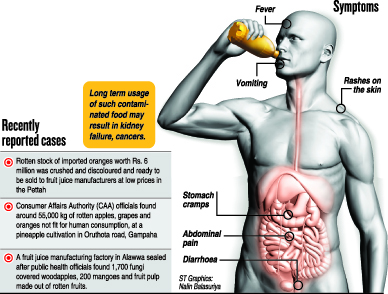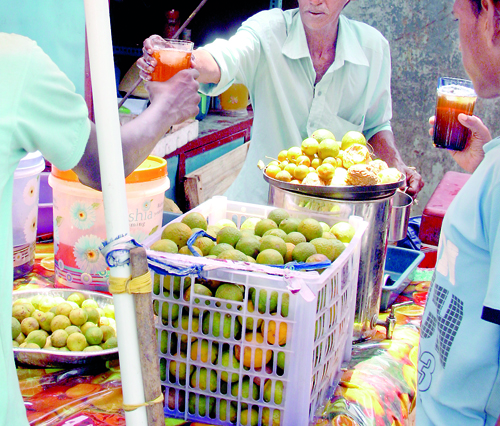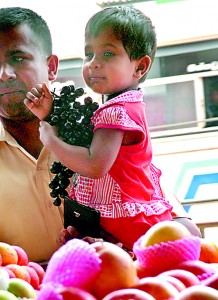News
Something could be rotten in that fruit juice
Fruit juice is considered a power-packed drink full of vitamins and other minerals for today’s busy consumer. But recent raids that have unearthed thousands of kilos of rotten fruits sold on the street, used at juice bars and fruit pulp factories have raised questions about the quality of fruit juices produced here.
Last week, the Consumer Affairs Authority raided a warehouse in Orutota, Gampaha and found over 50,000 kilos of rotten imported apples, grapes and oranges , discards from supermarkets, ready to be sent off to a fruit pulping factory, while 25,000 kilos of rotten oranges were seized from a leading importer in Pettah. A raid at a warehouse in Wattala revealed about 200,000 rotten oranges ready to be sold to unsuspecting customers.
“These fruits were to be repacked and sold at a low price to unsuspecting customers along the pavements, as well as to factories that produce fruit pulp for cordials and fresh juices. Most of the time spoilt fruits are mixed up with good ones late at night or in the early hours of the morning. Our raids were conducted late at night following tip-offs,” Nipun Ekanayake, Trade Ministry spokesman said.
He said many consumers these days are buying fruit juices available at wayside stalls on the pavement and small-scale shops in and around Colombo due to the prevailing hot weather.

Beware of wayside stalls that have sprung up selling fruit juice to thirsty consumers. Pix by Indika Handuwala and Amila Prabodha
This January, a fruit juice manufacturing factory in Alawwa was sealed after public health officers found thousands of fungi-infected wood apple, hundreds of rotten mangoes as well as plastic containers filled with pulp made out of spoilt fruits with worms.
According to public health officers, the juice-making factory was supplying pulp to a leading manufacturer.
Health Ministry’ Nutrition Division Head Dr.U.M.M.Samaranayake, warned that consuming these fruits and fruit juices could result in health hazzards ranging from diarrhoea to stomach cramps and more severe diseases such as cancer and kidney failure, if consumed for several years.
“In countries, where fruit juice is consumed on a daily basis, the rules regarding production are very effective and the manufacturing plants are constantly monitored. But here public health officers only check on the hygiene. But it is important to check on the nutritious value of these juices that are produced,” he said.

How safe are these fruits ?
Dr. Samaranayake also said teams consisting of nutritionists too should be deployed to check fruit juices produced at factories and made in juice bars, restaurants, hotels etc.
“Unfortunately there is also no unit, no facilities available to analyse the quality of imported fruits although they are consumed by children, health conscious people, the elderly and the sick,” he added.
According to Customs, the country had imported 21 million apples, 10 million mandarins, 5.9 million oranges and 5.1 million grapes in 2012.


